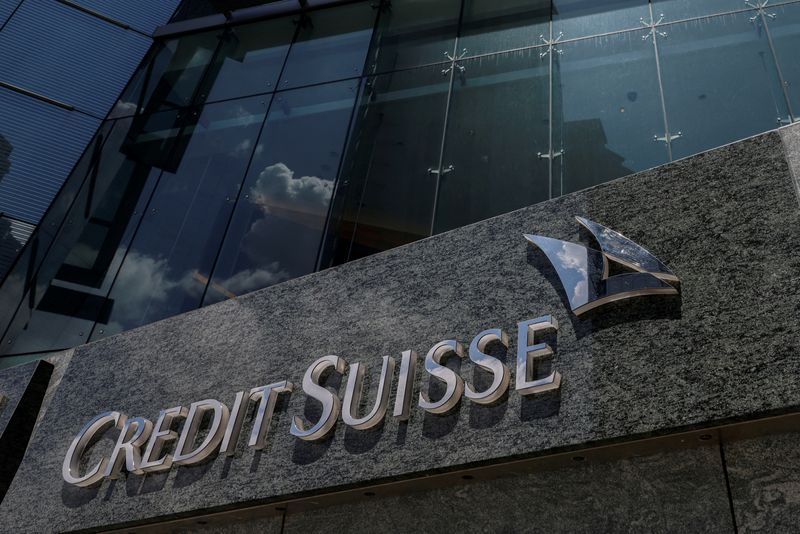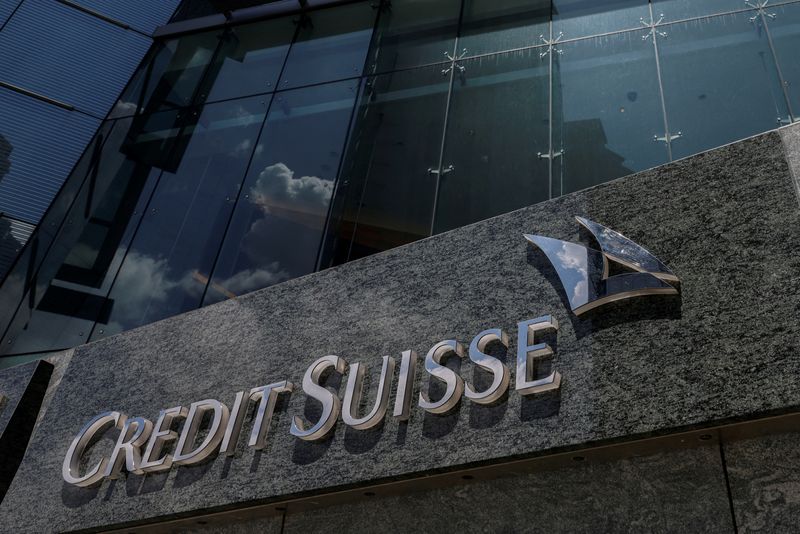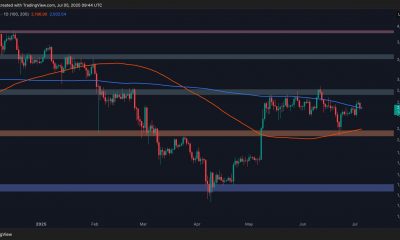Economy
Credit Suisse, Mozambique secure out-of-court ‘tuna bond’ settlement


© Reuters. FILE PHOTO: The logo of Credit Suisse is seen outside its office building in Hong Kong, China, August 8, 2023. REUTERS/Tyrone Siu/File Photo
By Noele Illien and Kirstin Ridley
ZURICH (Reuters) -Credit Suisse has reached an 11th-hour out-of-court settlement with Mozambique over the decade-old $1.5 billion-plus “tuna bond” scandal, the Swiss bank’s new owner UBS said on Sunday, drawing a line under a damaging dispute it inherited.
“The parties have mutually released each other from any liabilities and claims relating to the transactions,” UBS said in a statement. “The parties are pleased to have resolved this long-running dispute,” it added without giving further details.
Under the deal, struck one day before a three-month London civil trial was due to start, UBS will forgive part of a loan that Credit Suisse made to Mozambique in 2013, representing less than $100 million, said one source familiar with the situation, who declined to be named because the terms are not public.
In Maputo, the Mozambican Attorney General’s Office and Ministry of Economy and Finance said they were calling a joint news conference for Monday morning.
The tuna bond case dates back to deals between state-owned Mozambican companies and shipbuilder Privinvest – funded in part by loans and bonds from Credit Suisse and backed by undisclosed Mozambican government guarantees in 2013 and 2014 – ostensibly to develop the fishing industry and for maritime security.
But hundreds of millions of dollars went missing and, when the government debt came to light in 2016, donors such as the International Monetary Fund temporarily halted support, triggering a currency collapse, defaults and financial turmoil.
The settlement included most of the creditors involved in funding a 2013 loan to ProIndicus, a state-owned Mozambican company, UBS said.
DRAWING A LINE
UBS, which took over scandal-scarred Credit Suisse amid turmoil in the global banking sector earlier this year, has pledged to resolve Credit Suisse’s legacy legal disputes.
Since completing the mega merger on June 12, it has paid $388 million to U.S. and British regulators over dealings with collapsed private investment firm Archegos Capital Management and settled a dispute with a finance blog.
The latest settlement leaves French shipping mogul Iskandar Safa and his Privinvest group among key remaining defendants in a High Court battle over the funding and maritime deals that have already triggered U.S. and Mozambican criminal proceedings.
Mozambique has alleged it was the victim of a conspiracy and that Privinvest paid bribes to corrupt Mozambican officials and Credit Suisse bankers, exposing the country to a potential liability of at least $2 billion.
Privinvest has alleged it delivered on all of its obligations under the contracts and that any payments it made were either investments, consultancy payments, legitimate remuneration or legitimate political campaign contributions.
The company did not immediately respond to a request for comment.
NYUSI IMMUNITY
In another twist to the complex case, Privinvest on Friday secured permission to appeal against a London High Court decision to grant Mozambican President Filipe Nyusi immunity from the proceedings. Privinvest has argued that if it is found liable, Nyusi should contribute to any damages.
Officials in the Maputo government did not immediately respond to a request for comment.
Court of Appeal Judge Elizabeth Laing said it was now up to the trial judge to grant any applications for adjournment, a decision seen by Reuters over the weekend showed.
In 2021, Credit Suisse agreed to pay about $475 million to British and U.S. authorities to resolve bribery and fraud charges and has pledged to forgive $200 million of debt owed by Mozambique.
It has alleged three former bankers, who arranged the bonds and have pleaded guilty in the United States to handling kickbacks, hid their misconduct from the bank.
Economy
Russian central bank says it needs months to make sure CPI falling before rate cuts -RBC


© Reuters. Russian Central Bank Governor Elvira Nabiullina attends a news conference in Moscow, Russia June 14, 2019. REUTERS/Shamil Zhumatov/File Photo
MOSCOW (Reuters) – Russia’s central bank will need two to three months to make sure that inflation is steadily declining before taking any decision on interest rate cuts, the bank’s governor Elvira Nabiullina told RBC media on Sunday.
The central bank raised its key interest rate by 100 basis points to 16% earlier in December, hiking for the fifth consecutive meeting in response to stubborn inflation, and suggested that its tightening cycle was nearly over.
Nabiullina said it was not yet clear when exactly the regulator would start cutting rates, however.
“We really need to make sure that inflation is steadily decreasing, that these are not one-off factors that can affect the rate of price growth in a particular month,” she said.
Nabiullina said the bank was taking into account a wide range of indicators but primarily those that “characterize the stability of inflation”.
“This will take two or three months or more – it depends on how much the wide range of indicators that characterize sustainable inflation declines,” she said.
The bank will next convene to set its benchmark rate on Feb. 16.
The governor also said the bank should have started monetary policy tightening earlier than in July, when it embarked on the rate-hiking cycle.
Economy
China identifies second set of projects in $140 billion spending plan


© Reuters. FILE PHOTO: Workers walk past an under-construction area with completed office towers in the background, in Shenzhen’s Qianhai new district, Guangdong province, China August 25, 2023. REUTERS/David Kirton/File Photo
SHANGHAI (Reuters) – China’s top planning body said on Saturday it had identified a second batch of public investment projects, including flood control and disaster relief programmes, under a bond issuance and investment plan announced in October to boost the economy.
With the latest tranche, China has now earmarked more than 800 billion yuan of its 1 trillion yuan ($140 billion) in additional government bond issuance in the fourth quarter, as it focuses on fiscal steps to shore up the flagging economy.
The National Development and Reform Commission (NDRC) said in a statement on Saturday it had identified 9,600 projects with planned investment of more than 560 billion yuan.
China’s economy, the world’s second largest, is struggling to regain its footing post-COVID-19 as policymakers grapple with tepid consumer demand, weak exports, falling foreign investment and a deepening real estate crisis.
The 1 trillion yuan in additional bond issuance will widen China’s 2023 budget deficit ratio to around 3.8 percent from 3 percent, the state-run Xinhua news agency has said.
“Construction of the projects will improve China’s flood control system, emergency response mechanism and disaster relief capabilities, and better protect people’s lives and property, so it is very significant,” the NDRC said.
The agency said it will coordinate with other government bodies to make sure that funds are allocated speedily for investment and that high standards of quality are maintained in project construction.
($1 = 7.1315 renminbi)
Economy
Russian central bank says it needs months to make sure CPI falling before rate cuts -RBC


© Reuters. Russian Central Bank Governor Elvira Nabiullina attends a news conference in Moscow, Russia June 14, 2019. REUTERS/Shamil Zhumatov/File Photo
MOSCOW (Reuters) – Russia’s central bank will need two to three months to make sure that inflation is steadily declining before taking any decision on interest rate cuts, the bank’s governor Elvira Nabiullina told RBC media on Sunday.
The central bank raised its key interest rate by 100 basis points to 16% earlier in December, hiking for the fifth consecutive meeting in response to stubborn inflation, and suggested that its tightening cycle was nearly over.
Nabiullina said it was not yet clear when exactly the regulator would start cutting rates, however.
“We really need to make sure that inflation is steadily decreasing, that these are not one-off factors that can affect the rate of price growth in a particular month,” she said.
Nabiullina said the bank was taking into account a wide range of indicators but primarily those that “characterize the stability of inflation”.
“This will take two or three months or more – it depends on how much the wide range of indicators that characterize sustainable inflation declines,” she said.
The bank will next convene to set its benchmark rate on Feb. 16.
The governor also said the bank should have started monetary policy tightening earlier than in July, when it embarked on the rate-hiking cycle.

 Forex3 years ago
Forex3 years agoForex Today: the dollar is gaining strength amid gloomy sentiment at the start of the Fed’s week

 Forex3 years ago
Forex3 years agoUnbiased review of Pocket Option broker

 Forex3 years ago
Forex3 years agoDollar to pound sterling exchange rate today: Pound plummeted to its lowest since 1985

 Forex3 years ago
Forex3 years agoHow is the Australian dollar doing today?

 Cryptocurrency3 years ago
Cryptocurrency3 years agoWhat happened in the crypto market – current events today

 World3 years ago
World3 years agoWhy are modern video games an art form?

 Commodities3 years ago
Commodities3 years agoCopper continues to fall in price on expectations of lower demand in China

 Economy3 years ago
Economy3 years agoCrude oil tankers double in price due to EU anti-Russian sanctions



























